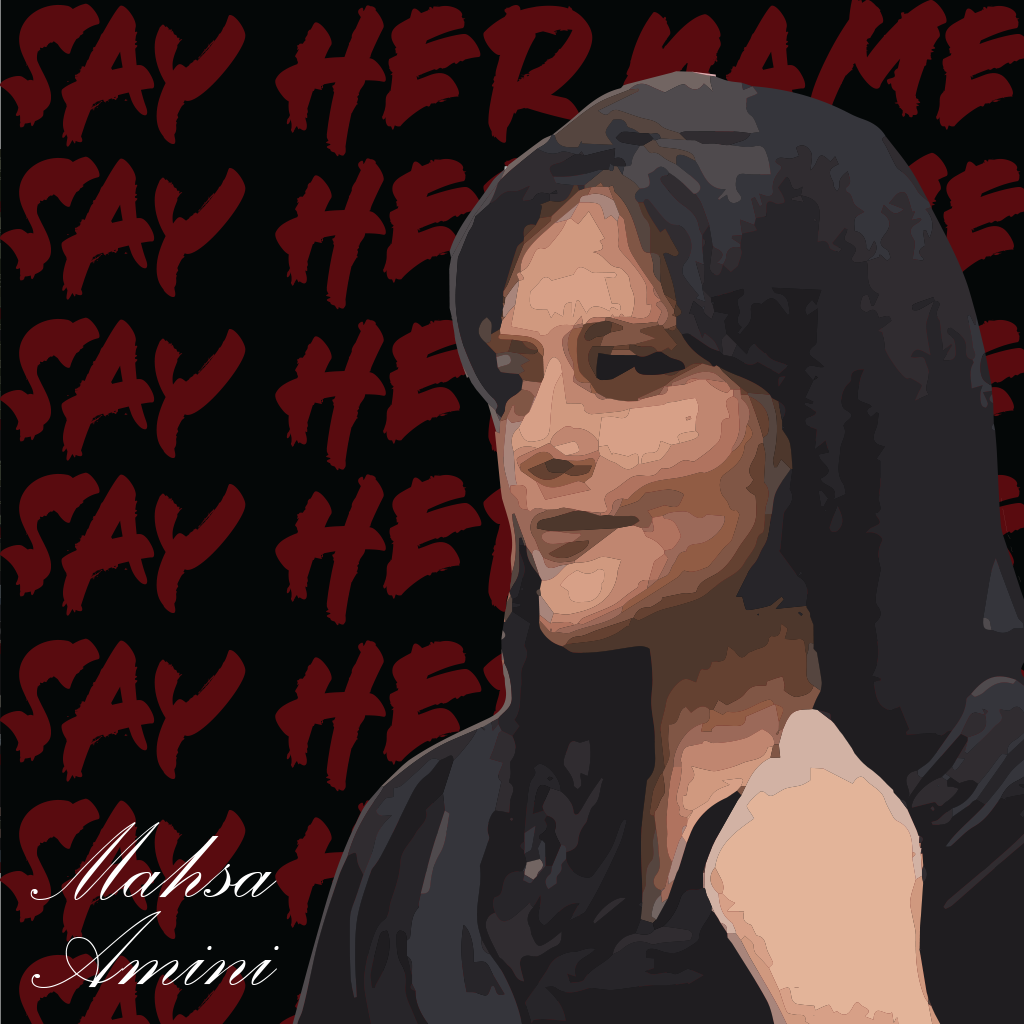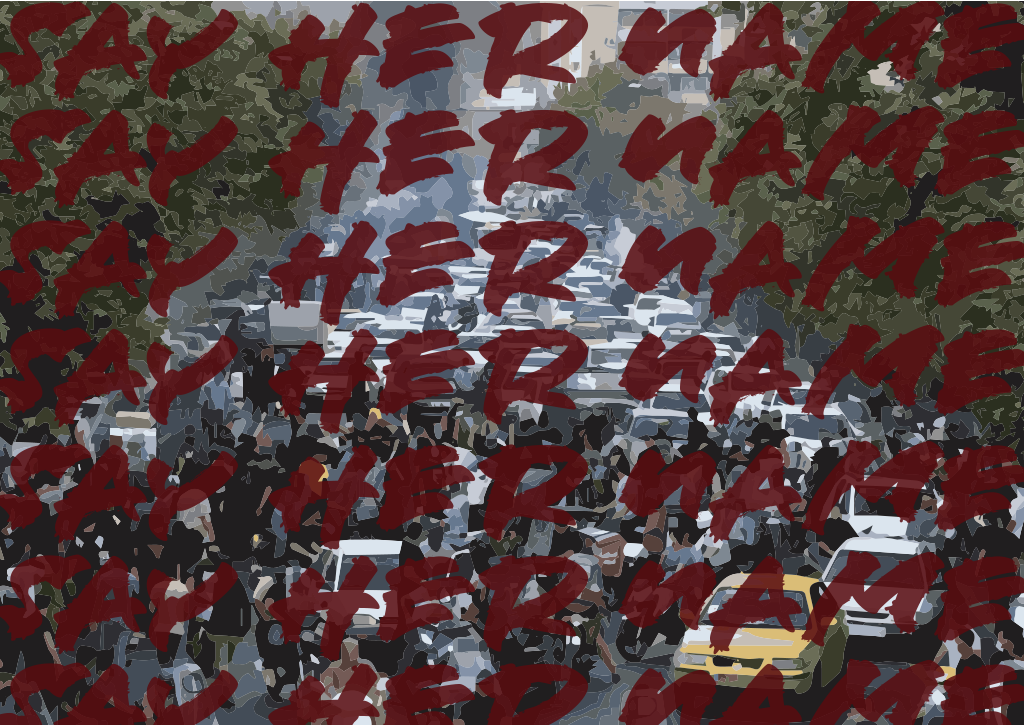 On 16 September 2022, the
22-year-old Iranian woman Mahsa Amini, also known as Jina Amini, died in a hospital in Tehran, Iran,
under suspicious circumstances. The Guidance Patrol, the religious morality police of Iran's government,
arrested Amini for allegedly not wearing the hijab in accordance with government standards. The Law
Enforcement Command of the Islamic Republic of Iran stated that she had a heart attack at a police
station, collapsed, and fell into a coma before being transferred to a hospital. However, eyewitnesses,
including women who were detained with Amini, reported that she was severely beaten and that she died as
a result of police brutality, which was denied by the Iranian authorities. The assertions of police
brutality, in addition to leaked medical scans,led some observers to believe Amini had a cerebral
hemorrhage or stroke due to head injuries received after her arrest.
On 16 September 2022, the
22-year-old Iranian woman Mahsa Amini, also known as Jina Amini, died in a hospital in Tehran, Iran,
under suspicious circumstances. The Guidance Patrol, the religious morality police of Iran's government,
arrested Amini for allegedly not wearing the hijab in accordance with government standards. The Law
Enforcement Command of the Islamic Republic of Iran stated that she had a heart attack at a police
station, collapsed, and fell into a coma before being transferred to a hospital. However, eyewitnesses,
including women who were detained with Amini, reported that she was severely beaten and that she died as
a result of police brutality, which was denied by the Iranian authorities. The assertions of police
brutality, in addition to leaked medical scans,led some observers to believe Amini had a cerebral
hemorrhage or stroke due to head injuries received after her arrest.
 Following news of
Amini’s death, protests spread across the country with women at the forefront. In Amini’s hometown of
Saqqez, in the Kurdistan Province, women took their hijabs off and chanted, “Death to the dictator.” In
Tehran, they ripped off their headscarves and waved them in the air; one protester climbed atop a car and
set fire to her hijab. Women followed suit in Sari with a mass burning, tossing their headscarves into a
large fire and dancing as they watched them go up in flames.
In Kerman’s Azadi Square, a woman disposed of her headscarf, took scissors to her hair, and chopped nearly
all of it off as the crowd around her cheered. Women around the world have been cutting their own hair in
protest of Amini’s death — including Abir Al-Sahlani, an Iraqi-born Swedish member of European Parliament,
who chopped off her hair during a speech at the E.U. assembly.
Following news of
Amini’s death, protests spread across the country with women at the forefront. In Amini’s hometown of
Saqqez, in the Kurdistan Province, women took their hijabs off and chanted, “Death to the dictator.” In
Tehran, they ripped off their headscarves and waved them in the air; one protester climbed atop a car and
set fire to her hijab. Women followed suit in Sari with a mass burning, tossing their headscarves into a
large fire and dancing as they watched them go up in flames.
In Kerman’s Azadi Square, a woman disposed of her headscarf, took scissors to her hair, and chopped nearly
all of it off as the crowd around her cheered. Women around the world have been cutting their own hair in
protest of Amini’s death — including Abir Al-Sahlani, an Iraqi-born Swedish member of European Parliament,
who chopped off her hair during a speech at the E.U. assembly.
 An ongoing series of
protests and civil unrest against the government of Iran began in Tehran on 16 September 2022 as a reaction
to the death of Amini that day following police custody of Amini.The protests began hours after Amini's
death, starting at the hospital in Tehran where she was treated and quickly spreading to other parts of the
country, first to Amini's hometown of Saqqez and other cities in the Kurdistan Province, including Sanandaj,
Divandarreh, Baneh, and Bijar. In response to these demonstrations, beginning around 19 September the
Iranian government implemented regional shutdowns of Internet access. As protests grew, a widespread
Internet blackout was imposed along with nationwide restrictions on social media. In response to the
protests, people held demonstrations in support of the government across several cities in Iran, in an
attempt to counter the protests. The Iranian government has referred to these counter-protests as
"spontaneous". The pro-government protesters called for the anti-government protesters to be executed, and
have referred to them as "Israel's soldiers", whilst shouting "Death to America" and "Death to Israel",
reflecting Iran's clerical rulers' usual narrative of putting the blame of the unrest on foreign countries.
On 3 October, in his first statement since the outbreak of the protests, Supreme Leader Ayatollah Ali
Khamenei dismissed the widespread unrest as "riots", and likewise tried to cast it as a foreign plot.
An ongoing series of
protests and civil unrest against the government of Iran began in Tehran on 16 September 2022 as a reaction
to the death of Amini that day following police custody of Amini.The protests began hours after Amini's
death, starting at the hospital in Tehran where she was treated and quickly spreading to other parts of the
country, first to Amini's hometown of Saqqez and other cities in the Kurdistan Province, including Sanandaj,
Divandarreh, Baneh, and Bijar. In response to these demonstrations, beginning around 19 September the
Iranian government implemented regional shutdowns of Internet access. As protests grew, a widespread
Internet blackout was imposed along with nationwide restrictions on social media. In response to the
protests, people held demonstrations in support of the government across several cities in Iran, in an
attempt to counter the protests. The Iranian government has referred to these counter-protests as
"spontaneous". The pro-government protesters called for the anti-government protesters to be executed, and
have referred to them as "Israel's soldiers", whilst shouting "Death to America" and "Death to Israel",
reflecting Iran's clerical rulers' usual narrative of putting the blame of the unrest on foreign countries.
On 3 October, in his first statement since the outbreak of the protests, Supreme Leader Ayatollah Ali
Khamenei dismissed the widespread unrest as "riots", and likewise tried to cast it as a foreign plot.
